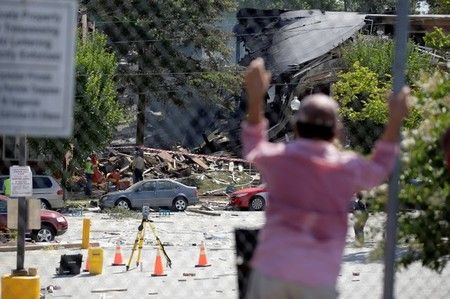Advertisement
Ford has temporarily halted work on its $3

Ford Pauses Construction On $3.5 Billion EV Battery Plant In Michigan
Backdrop of the Decision
Ever wonder how economic forces and corporate strategies could influence industrial developments? Well, today we will be discussing Ford Motor Company’s recent decision to pause construction on a $3.5 billion Electric Vehicle (EV) battery plant in Michigan. Such decisions are often influenced by a myriad of factors – including market dynamics, governmental regulations, and financial considerations.
The project, nicknamed “Blue Oval City”, had been previously announced with great excitement as it marked Ford’s major push into the burgeoning realm of electric vehicles, aligning with global initiatives to reduce carbon footprints. Yet why did such an ambitious project hit pause? We see that sometimes even the best laid plans are subject to change and adaptation.
In understanding this situation, context is crucial. The automobile industry is seeing a historic transformation from internal combustion engines to electrically powered vehicles, driven by an increasingly eco-conscious world. In light of this, let’s delve deeper into the specifics of Ford’s situation.
To illustrate, consider the following scenario: imagine being handed an ambiguous puzzle where you need to weigh different pieces’ relevance and move them around to see the bigger picture. This is what corporations like Ford do when strategizing about their future business moves.
- Ford’s initial plan included building an integrated battery cell manufacturing facility in Stanton, Tennessee.
- The projected cost for this ambitious endeavor was pegged at roughly $3.5 billion dollars.
- Apart from an EV vehicle factory, the undertaking would also include a logistics hub and a supplier park.
- This initiative promised approximately 11,000 jobs, making a substantial impact on local employment figures.
- It is not just any ordinary factory — it is set to become one of the largest automotive facilities in America.
- The plant was projected to churn out electric F-Series pickups and advanced batteries.
What Prompted the Pause?
Upon hearing the words ‘pause construction’, one might think there’s a major issue or setback, but it’s essential to understand that decisions like these can often be strategic. In Ford’s case, this is quite accurate.
Just as chess players contemplate multiple steps ahead before making their move, businesses too consider numerous short-term and long-term factors before making significant investment decisions. On that note, let’s explore what may have initiated Ford’s decision to shift gears.
Imagine playing a game of Monopoly where you’re optimistic about landing on a lucrative property spot. However, upon assessing your financial status and the overall dynamics of the game, you decide to hold off on buying to avoid risking bankruptcy. This scenario fairly encapsulates a corporation’s prudent approach when new regulations or economic situations arise affecting their projects.
- Ford cites unexpected geopolitical issues and inflation concerns as reasons for pausing the construction.
- Newly proposed labor rules by the Biden administration are narrowing the subsidies for EVs built with union labor, proving disadvantageous for corporations like Ford.
- The fear of stagflation (stagnating growth combined with rising prices) has also played a part in Ford’s reconsideration, as global supply chains remain disrupted due to the COVID-19 pandemic.
- In addition, there are potential implications from trade tensions between the United States and China, which might affect Ford’s operational costs.
- Sometimes, pausing to reassess and recalibrate strategies could prevent potential pitfalls in the future.
- This pause doesn’t necessarily mean a stop—it signifies an opportunity for re-evaluating market conditions and recalibrating strategies.
The Broader Impact
Each business decision doesn’t exist in isolation—it’s a part of the intricate societal and economic mechanism. Considering the factory’s scale and perceived impact on employment, this pause naturally raises concerns among numerous stakeholders.
Think of it as a large stone thrown into a calm lake—the disturbance doesn’t simply affect the point of impact but sends ripples across the otherwise serene environment. Similarly, Ford’s decision will not only touch upon its own operations but also affect the surrounding community, suppliers, and industry trends.
- The halt in construction may cause a delay in job creation and economic development in Michigan.
- Suppliers who made plans based on initial projections from Ford may need to readjust their expectations and timelines.
- This situation serves as a reminder to all stakeholders that even well-planned projects can face unexpected roadblocks or diversions.
- The auto industry and investors will watch closely how Ford navigates through this episode, building lessons for themselves.
- Competitors might take advantage of this situation to speed up their EV projects and gain a competitive edge.
- This could potentially serve as a case study for other manufacturers contemplating similar investments in an uncertain global climate.
A Glance at the Summary Table
For your quick reference, let’s summarize the key points in the table below.
| Component | Description |
|---|---|
| Ford’s initial plan | Keys in establishing an integrated battery plant costing $3.5 billion in Stanton, Tennessee |
| Reason for pause | Rising geopolitical tensions, inflation worries, and proposed labor rules by Biden administration |
| Potential broader impact | Delay in job creation, ripple effects on suppliers, lessons for the automobile industry |
Looking into the Future
While it’s easy to get lost in the immediacy of Ford’s decision to pause construction, it’s crucial to keep an eye down the road. This is not just about a factory – it’s about the future of EVs and how corporations navigate the intricate landscape of geopolitics, regulations, and economic fluctuations.
Crucially, this pause doesn’t spell the end of Ford’s EV ambitions but signals a momentary slowdown in their journey. If regarded as a traffic light indicator, it’s more of an ‘amber’— a signal to proceed with caution rather than a red ‘stop’.
In this scenario, imagine Ford as a skilled driver, adjusting his speed based upon the road conditions, striving to navigate a safe and successful course to their desired destination—the world of electric vehicles.
- Ford remains committed to zero emissions and electric vehicles despite pausing the project.
- This decision could be something other auto corporations need to consider under similar circumstances or business climates.
- The automotive giant is currently reassessing its strategies, hinting at unswerving commitment towards sustainability and technological innovation.
- Through careful planning and strategic decision making, Ford aims to come out stronger on the other side, well-positioned to compete effectively within the evolving EV market.
- Real-time adjustments such as these prove that Ford is closely tuned in to the global market dynamics, ready to steer accordingly.
- This situation underlines that Ford’s journey towards a greener future is going forward, albeit with some recalibrations along the way.
The Wrap Up
In sum, Ford’s decision is reflective of corporate resilience in the face of uncertainty and complexities. Proactive decisions like these can become instrumental in long-term planning, shifting from being reactive to unexpected circumstances to becoming proactive managers of change.
So next time you hear about big corporations pausing their projects, remember—it’s not an abrupt stop, but rather a strategic slowdown, allowing them to reassess and realign their strategies in light of evolving contexts. In Ford’s case, we see how integral strategy, foresight, and adaptability are to operating successfully within a rapidly changing world.
Just like a suspenseful movie plot where the protagonist hits a roadblock before the climax, Ford’s story serves as a fascinating reminder of how twists and turns can serve to build a stronger narrative outrunning obstacles and racing towards success.
- Ultimately, pausing the Blue Oval City project demonstrates Ford’s prudential approach and flexibility in dealing with global changes.
- This decision could spell a significant milestone in Ford’s journey, marking willingness to adapt promptly to external conditions.
- Moreover, it represents a well-thought-out strategic move, mitigating potential risks amidst rising economic and geopolitical uncertainties.
- Ford has a clear-eyed view of headwinds, acknowledging uncertainties, and demonstrating adaptability to ensure it moves closer to its vision.
- Real-time adjustments such as these show how Ford is fine-tuning its approach to better navigate the transformative journey towards EVs.
- Even as Ford navigates this potentially rocky moment, their eyes remain firmly fixed on a greener and technologically driven future.
Final Remarks
Taking a pause doesn’t denote negation; it could be seen as a thoughtful interlude for reassessment and recalibration. What’s critical is to understand the broader picture surrounding these business decisions. It’s just like real-life situations—whenever you encounter an unexpected obstacle or change, remember, it doesn’t mean the end. Instead, it often opens up new pathways and possibilities, inviting us to stop, think and readjust our strategies.
Just as life throws curveballs, business environments too are rife with uncertainties and changes—impacting corporations like Ford. Yet, the way they adapt and tackle these challenges holds lessons for everyone and serves as a reminder of how resilience, foresight, and strategic flexibility can shape successful outcomes.
It’s not about stopping at every bump; instead, it’s about adjusting your mirrors, ensuring your lights are working, and then continuing along the ever-evolving road towards a greener and brighter tomorrow!
- Situations like what Ford is experiencing emphasize the need for businesses to remain agile amid uncertain and changing landscapes.
- This episode also shows how major corporations strategically navigate through seemingly unforeseen circumstances while keeping an eye on their long-term goals.
- Ford’s situation also highlights that strategic pauses should not be interpreted as failure but rather prudential decision-making in advance of potential economic turmoil.
- The flexibility Ford has demonstrated in response to this unexpected alteration reaffirms its stature as a seasoned player within the commercial landscape.
- The uncertainty surrounding the present scenario underscores the volatility of modern business environments, where agility and expedient decision-making are prime.
- The road may sometimes be bumpy, but with strategic planning and careful execution, corporations like Ford can continue to steer successfully towards greener pastures.









